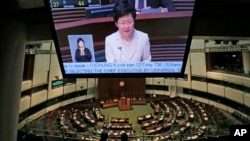Hong Kong's pro-Beijing government unveiled a set of electoral reform proposals that ignore the demands of pro-democracy protesters.
The blueprint announced Wednesday technically allows the semi-autonomous Chinese territory to elect its leader in 2017 for the first time ever.
But it also strictly complies with Beijing's insistence all candidates for the top leadership spot be approved by a pro-China nominating committee.
Opposition lawmakers condemn the plan as an attempt at fake democracy and vow to veto the blueprint when it comes to a vote later this year.
After the plan was unveiled Wednesday, many pro-democracy lawmakers marched out of the Legislative Building in a sign of disgust.
Protesters also gathered outside the chamber. Some carried pro-government signs. Others held yellow umbrellas - a sign of the pro-democracy movement.
Democracy activists held more than two months of mass street protests and sit-ins at the end of last year to demand what they refer to as genuine democracy.
At one point, the protesters blocked several key roads and numbered in the tens of thousands, posing a significant political challenge to Beijing.
Beijing and Hong Kong officials refused to give in to the protesters' demands, instead declaring the gatherings illegal and forcibly breaking them up.
Hong Kong, a former British colony, was returned to China in 1997. As a semiautonomous Chinese territory, its citizens still enjoy many freedoms not allowed on the mainland.
China has long promised to allow the territory's residents to elect their leader directly in the 2017 vote. In the past, that has been done by a pro-Beijing election committee.
Hong Kong's leaders say the electoral reforms are as much as can be expected at the time, and have pushed for pro-democracy leaders to support the plan.





